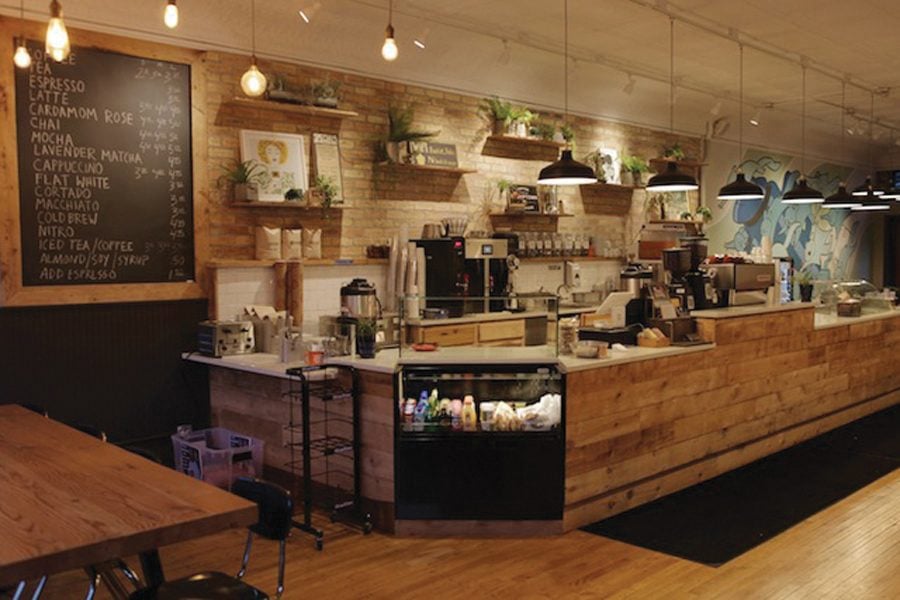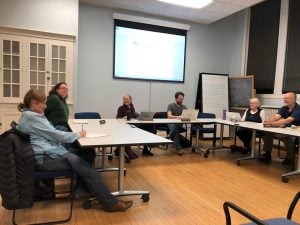Sustain Evanston recognizes 17 businesses
Backlot Coffee, 2006 Central St. Backlot Coffee received Sustain Evanston recognition, and it will continue its sustainable practices at its third location.
October 23, 2019
Sustain Evanston, a program that seeks to promote sustainability in Evanston companies, recognized 17 businesses in 2019 for environmentally friendly practices.
The program, which launched after City Council passed the Climate Action and Resilience Plan, seeks to recognize Evanston businesses that have taken steps to become more sustainable and help achieve the city’s goals of carbon neutrality, zero waste and renewable electricity, according to its website.
Restaurants and office or retail businesses are open to join the program, which rewards recognized businesses with $250. Alyson Wright, Evanston’s sustainable business fellow, said the program acts as an alternative for smaller businesses, in comparison to more expensive national and state programs that are designed for larger businesses.
Interested companies are given a checklist of 20 items, and must complete 10, including the required steps of providing clear sorting for recycling and achieving a 50 percent recycling diversion rate for both restaurants and offices/retailers, as well as implementing a composting program for restaurants.
“A great way to get businesses involved and be sustainable is through kind of an incentive, versus doing anything like an ordinance,” Wright said. “This can be more fun, more exciting. It’s a better way to reach people.”
Businesses also receive a decal to place on their storefront indicating they are a Sustain Evanston business. Sustain Evanston follows in the footsteps of sustainable actions already taken by some Evanston businesses.
Backlot Coffee, for example, got rid of plastic straws back in April 2018 and had begun composting as well.
“The Sustain Evanston was everything we were already doing,” said John Kim, co-founder of Backlot. “We just needed to show that we were already doing it.”
Backlot Coffee was one of only two restaurants recognized in 2019, with Kombucha Brava snagging the other recognition. Kim said he wants to continue to reduce the waste associated with a typical coffee shop and encourage customers not to throw things away.
Wright said in the future, the city hopes to target more sit-down restaurants for the program, but that the city understands there can be barriers to completing the program, such as time and space limitations.
“We realized that a large barrier that some businesses actually face in being sustainable is that they rent their space,” Wright said. “They don’t have the option to make changes like installing LED lighting.”
To address these changes, the city slightly tweaked the program’s checklist after its pilot run to make it more accessible.
For Laura Demke-Calixte, the CEO and president of Electronic Processing of North America, LLC, the process of getting Sustain Evanston recognition was a “fun journey.”
She said her company started small and stopped bagging the terminals and supplies it sells to merchants, and started serving coffee in ceramic cups at meetings. She recommends that companies looking to begin the sustainability process start with small, easy actions.
“(Make) sure you do the easy stuff right away to make it not so daunting,” she said. “Just doing the things that maybe come easy to you, and start pricing things out as well. When you think about the environment and the sustainability of it all, things could be more expensive. Not all the time, but they could be.”
The city is hoping to incorporate more types of businesses into Sustain Evanston in the future, Wright said. She said she’s received interest from a landscaping company, a construction company and a home office.
Wright said the city hopes to restart the program in January 2020.
Email: [email protected]
Twitter: @emmaeedmund




